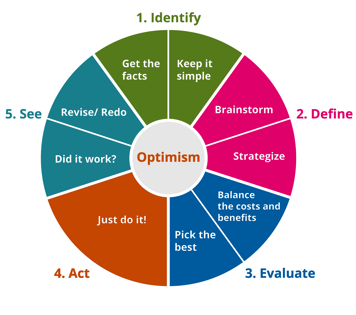Having everyday problems in your life can be hard, but having extra problems due to the challenges of sickle cell disease can feel overwhelming.
Everyone has solved problems in their lives before, for example figuring out what to have for dinner if there was not much food in the house or how to resolve tension if children were arguing. These are everyday problems that may or may not result in too much stress.
The aim of this module and the next one is to provide you with a set of specific skills that will help you solve some of the trickier problems or concerns faced by parents and caregivers of children and teens with sickle cell disease.
The value of learning problem-solving skills
Learning the steps of problem solving will help you find new ways to approach problems and challenges. Once you learn the skills, you can apply them not only to challenges related to sickle cell disease but to many other parts of your life as well.
Becoming better at solving medical, family, school-related and other problems using the techniques in this module can help you to:
- feel less stressed
- feel calmer and more relaxed
- feel more in control
- be better able to spend more time and energy on yourself and your family
- be able to support your child’s needs more effectively
Problem-solving steps
There are five major steps in the problem-solving process. They are shown below in the Bright IDEAS wheel.

This module is going to focus on Optimism, which is a mindset that underlies the Bright IDEAS process. In the next module, you will work through Steps 1–5, which will help you solve problems more effectively.
Although the steps are not hard to master, problem solving is something that requires practice, just like any new skill.
Optimism

Optimism is at the centre of the Bright IDEAS wheel because it plays such a central role each time you begin to solve a problem.
Having optimism when problem solving means:
- understanding that the problems and challenges you have are normal and expected for anyone in your situation
- believing that you can use proven problem-solving strategies to help you solve different problems and challenges in your life
The way you think about problems can greatly influence the way you cope with them and any stress they bring. The following pages will cover how problems can be viewed negatively or positively.
